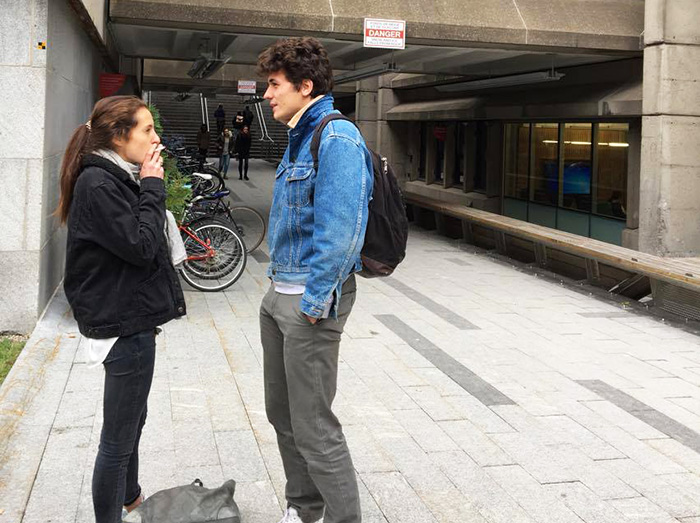On Sept. 25, a town hall meeting was held to discuss McGill’s potential transition to a smoke-free campus. According to plebiscites run by both the Students’ Society of McGill University (SSMU) and the Post-Graduate Students’ Society (PGSS) in 2016, 73 per cent of undergraduate students and 77 per cent of graduate students would like a smoke-free campus.
Quebec law prohibits smoking within a nine-metre radius of any door leading to a university building. The proposed policy–which is currently in draft form–will not allow smoking anywhere on campus. Products specified in the policy include those that use tobacco or tobacco derived substances and produce vapour or smoke.
According to Paul Guenther, senior campus planner, the creation of the new policy was initiated in the Spring of 2016. The draft was developed by a working group comprised of various student and administration representatives that included PGSS Member Services Officer Jenny Ann Pura, SSMU Vice President (VP) University Affairs Erin Sobat, Associate Dean of Students Glenn Zabowski, Director of McGill Security Services Pierre Barbarie, and other officials.
“[There were] the complaints from the student community regarding the amount of second-hand smoke on campus, especially in the [McLennan-Redpath Library] underpass,” Guenther said. “The Draft Policy was developed and presented by the SSMU to the university in Spring 2016 […. In] April 2016, [we received a] request from the Ministère de la Santé et des Services sociaux du Québec [Ministry of Health and Social Services of Quebec] that all Quebec post-secondary institutions create a non-smoking policy and establish non-smoking environments by Nov. 26, 2017.”
The current Draft Policy was developed with the SSMU Draft Smoking Policy as a framework and incorporates other evidence-based research.
“This research included campus-wide surveys, academic literature from peer-reviewed journals, and exploring best-practices from other university campuses,” Guenther said.
For the working group, the focus of the new policy is to ensure a safer, healthier, and cleaner campus for the entire community.
“The rights of one person and their desire to smoke should not negatively impact the rights of other people and their health,” Guenther said. “This is the main issue.”
The policy will be self-enforced by the McGill community. David Benrimoh, a first year psychiatry resident and a member of the smoking policy working group, noted that self-enforcement has worked well on other campuses.
“Security went around at Harvard [for example] with little cards explaining the policy to smokers,” Benrimoh said. “Eventually, people will understand the policy. It becomes part of the culture of the campus. It becomes a part of the incoming mindset of the students coming to the university.”
Harvard implemented a non-smoking policy in 2014. Sixty-Five per cent of students and seventy-two per cent of faculty and staff members reported a noticeable decline in campus smoking within the year of implementation.
In response to the smoking draft policy, Student Services has begun the development of student-focused non-smoking campaigns. Currently, the health benefit plan that covers students and staff on campus subsidizes counselling while the Régie de L’assurance Maladie du Québec (RAMQ) includes access to cessation tools for people who want to stop smoking.
While there are benefits to a smoke-free campus, concerns remain. SSMU Engineering Senator Alexander Dow noted that smoking off campus could pose a safety issue.
“The [Schulich doors] don’t allow access back to FDA [after hours],” Dow said. “To come back into the building, you have to walk all the way back to McConnell. I’ve had a security incident there. I can second saying that the street isn’t always the safest place [to smoke].”
A previous version of this article stated that SSMU has begun the development of student-focused non-smoking campaigns. In reality, these campaigns are being run by Student Services. A previous version also stated that it is McGill policy for smokers to be at least nine metres away from building entrances, when in fact this is Quebec law. The Tribune regrets these errors.








